 |
  |
 |
  |
Bharat Dave carved a niche for himself in theatre - Dr. S.D. Desai e-mail: sureshmrudula@gmail.com May 25, 2021 Veteran theatre director Bharat Dave (1948-2021) was a multi-talented person, so unassumingly close to all of us that we never realized he had these talents. Even when in ICU, he did not let us think he was on his death bed. He picked up the smart phone lying by his side the other day and texted in the group his daughter Devaki had thoughtfully formed for his friends and on having briefly described his condition, he mentioned "many shows yet to be held and many books in the pipeline." 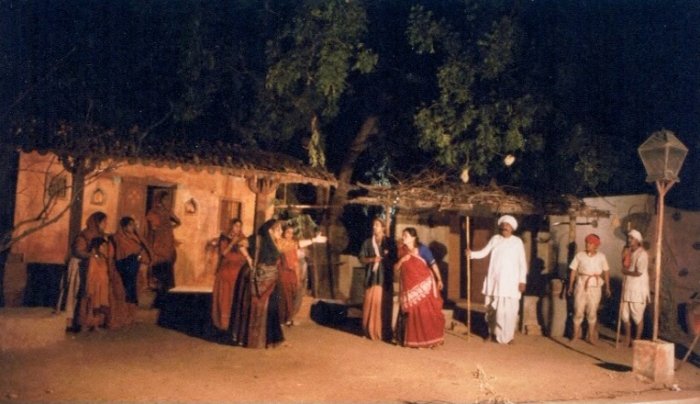 Manavi-ni Bhavai Manavi-ni Bhavai (1987) has been his magnum opus. It is a moving tale of a distressed famine hit village in which the flame of love between two young lovers, separated, burns steady affirming that even in the midst of devastation it is this core human feeling that holds the lantern of light. Presented on the Sahitya Parishad grounds as an environmental theatre experience with Goverdhan Panchal's sets created after the team's visit to Mandali, the native place of the Gyanpeeth award winner Pannalal Patel, whose novel had been adapted for the play. Earlier during the year viewers got to see Irwin Shaw's anti-war Bury the Dead in Gujarati in the same form where dead soldiers rise from the grave. During the decade after he had returned from NSD with its prestigious Diploma in 1976, the young man who had preferred to not move to Mumbai to make a fast buck explored his range and depth with detours to Moliere and Stoppard with interesting experimental styles at modest venues. Under the banner of Saptasindhu, he did Shrikant Shah's one-acts too, some of them having existential man-woman relationship themes. A big moment came to him in 1980 when in his direction Madeera, C.C. Mehta's translation of Euripides' classic tragedy Medea was presented as part of a national festival to a full house. This was a time of struggle for Gujarati theatre. With the sudden exit of INT's Pravin Joshi (Mumbai) and Jashvant Thaker (Ahmedabad) now not in his prime, there was a manifest void and young directors were engaged in a mini epic saga of revival in varying styles. With socially relevant themes, pre-production preparedness and an artistically satisfying dramatic style, graduating from short experimental beginnings to mainstream contributions, Bharat Dave gradually emerged with a distinctive identity and promise as a major amateur theatre director. 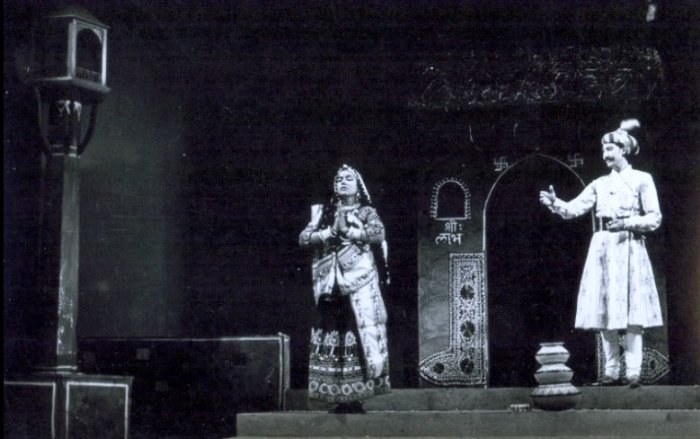 Mena Gurjari During the last two decades he was not as active on stage, but by the turn of the century he already had a number of major dramatic productions which have ensured him a niche in the history of Gujarati theatre. At B.V. Karanth's suggestion, with NSD repertory players like Uttara Baokar, Surekha Sikri and Anang Desai in lead roles, he produced Rasiklal Parikh's Mena Gurjari. Music played a prominent role in Tagore's Muktadhara as well in which he played the key role of Dhananjay Bairagi. His love for music stood him in good stead in the play having man versus machines as the theme infused with poetry. His aptitude for painting, incidentally, had Alkazi's active encouragement for it. 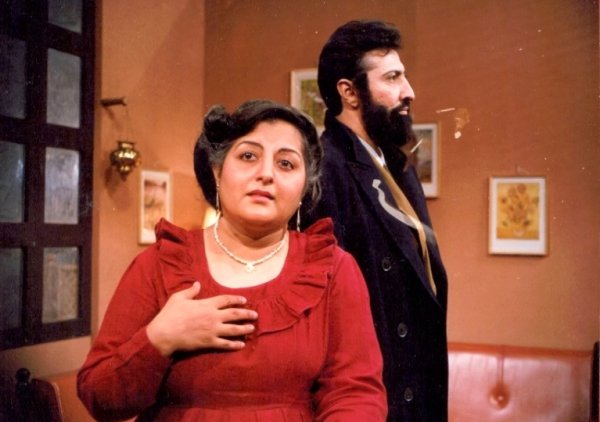 Sodo He was a thinking director with an exceptional sensibility. He had a special liking for Darshak's literary works which had got him the Gyanpeeth award. Dramatic art was at its best in Darshak's trilogy. In Sodo is Wellenberg's terse rejection of Nazi Colonel Hoss's offer to release a million Jews in bargain for soap cakes and tea. Helen portrays the love of a mother who refuses to appear as a witness against a Nazi official who had dishonoured her fifteen years ago. Prompted by the love of their motherland, three conscientious Nazis - a general, a minister and a pastor - defy Hitler's 'scorched-earth' orders. The impact the trilogy left remains etched in memory. I distinctly recall a screening of the neat tele-films he later made on them at ISRO, where as its chief producer he worked on notable socially relevant projects. It was probably a challenge of emotional expression and its naturalistic form that had him turn to Strindberg's three-act play The Father with his own translation of it as Vandhya. Laura aggressively asserts her right to daughter Bertha's education and goes on even to challenge his paternity and to prove his insanity. Later, he set the action of Ladai, a musical adaptation of Sarveshwar Dayal Saksena's social satire with its street play format on a terrace. It depicted the plight of a common man in a hypocritical society. A voracious reader with an analytical mind, he found his themes from world literature and treated them with seriousness or humour with the same ease. 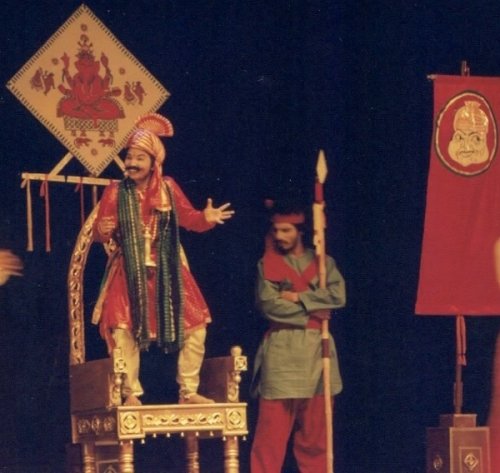 Guillotine ki Gutthi He attempted a social satire Polampol based on Nikolai Gogol's famous play The Inspector with himself in the lead role way back in 1981. His dramatic adaptation of Tolstoy's Too Dear as Guillotine-no Goto in a sustained lighter vein in the mid-nineties was pretty popular with the focus on the money spent on the keep, wellbeing and security of a criminal sentenced to death. With a veteran practicing Bhavai artist, he employed Gujarat's folk theatre form with such felicity in the workshop production Guillotine ki Gutthi with students from NSD in 1998 that in Theatre India and The Times of India, I envisaged 'a strong possibility of Gujarat finding its distinctive theatre idiom' through such explorations. Bharat Dave's Socrates, dramatically adapted by him from Darshak's novel, was keenly looked forward to twenty-five years ago. It did not take off from the reading stage. Actors not finding time was one of the reasons he cited. During his long career, he has developed many plays from famous literary works by local and foreign writers. Significantly, his favourite talented actor Raju Barot successfully produced Socrates with a huge cast in 2007. Bharat groomed many such actors, some of whom are now eminent. His insights in music, painting and light designs made it a pleasure for his team to work with him. During the last two decades he was not active on stage; he remained busy with writing on theatre. In the last decade he contributed to Gujarati literature, many valuable books on theatre. Beginning with Maari Rangayaatra, an autobiographical account of his evolution as a theatre person he went on to publish Vaastavavaadi Naatak (Realistic Drama), Aadhunik Bharatiya Rangabhoomi-na Sarjako (Makers of the Modern Indian Theatre) and Naatyasarjan (Play Production). Some of the books won him prestigious literary awards. 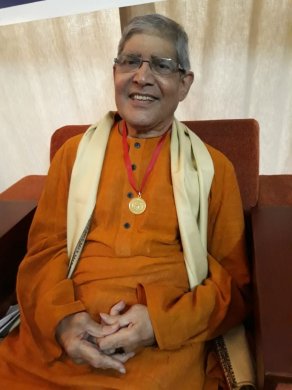 Bharat Dave As a theatre person, with a legacy received from his Gandhian father, he was driven by a sense of values and by drama as art by training. A good speaker, he gave many talks on the subject he loved. His lecture on Andhayug, Gandhiyug ane Aaj on World Theatre Day (27th March 2021) was his swansong. He drew a telling parallel between the post-Mahabharat decline in values as depicted by Dharmavir Bharati in his verse drama having epic dimensions and the post-Independence decline in values in India with observations on the repercussions of the bifurcation of what earlier was one nation. As in this lecture, Bharat Dave always believed that an artist cannot remain unconcerned about what was happening in his society and his country. He was fully in agreement with the novelist-playwright-thinker-teacher Darshak that there cannot be a greater illusion than an expectation in an atmosphere of rotten politics that our education, our society and every citizen in it will be better. Like Darshak, as a responsible member of society, he was fearless and forthright in his views and as an artist concerned with values and standards. 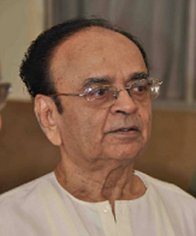
Dr. S.D. Desai, an author and a contributor to dance, drama and literary journals, is a freelance art writer. Post your comments Please provide your name and email id along with your comment. All appropriate comments posted with name and email id in the blog will also be featured in the site. |